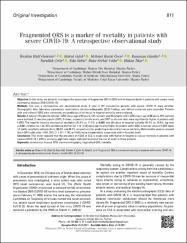Fragmented QRS is a marker of mortality in patients with severe COVID-19: A retrospective observational study

View/
Date
2021Author
Özlek, BülentÖzlek, Eda
Özdemir, Halil İbrahim
Özen, Mehmet Burak
Gündüz, Ramazan
Çetin, Nurullah
Yıldız, Bekir Sedat
Tıkız, Hakan
Metadata
Show full item recordCitation
Özdemir İH, Özlek B, Özen MB, Gündüz R, Çetin N, Özlek E, Yıldız BS, Tıkız H. Fragmented QRS is a marker of mortality in patients with severe COVID-19: A retrospective observational study. Anatol J Cardiol. 2021 Nov;25(11):811-820. doi: 10.5152/AnatolJCardiol.2021.62. PMID: 34734815.Abstract
Objective: In this study, we aimed to investigate the association of fragmented QRS (f-QRS) with in-hospital death in patients with severe novel coronavirus disease 2019 (COVID-19).
Methods: This was a retrospective and observational study. A total of 201 consecutive patients with severe COVID-19 were enrolled. Demographic data, laboratory parameters, medications, electrocardiographic (ECG) findings, and clinical outcomes were recorded. Patients with and without f-QRS were compared, and predictors of all-cause in-hospital mortality were analyzed.
Results: A total of 135 patients without f-QRS (mean age of 64 years, 43% women) and 66 patients with f-QRS (mean age of 66 years, 39% women) were included. C-reactive protein (CRP), D-dimer, troponin I, ferritin levels, and CRP to albumin ratio were significantly higher in patients with f-QRS. The need for invasive mechanical ventilation (63.6% vs. 41.5%, p=0.003) and all-cause in-hospital mortality [54.5% vs. 28.9%, log rank p=0.001, relative risk 1.88, 95% confidence interval (CI) 1.16-4.78] were significantly higher in patients with f-QRS. A number value of f-QRS leads ≥2 yields sensitivity and specificity (85.3% and 86.7%, respectively) for predicting in-hospital all-cause mortality. Multivariable analysis showed that f-QRS (odds ratio: 1.041, 95% Cl: 1.021-1.192, p=0.040) were independently associated with in-hospital death.
Conclusion: This study revealed that the presence of f-QRS in ECG is associated with higher in-hospital all-cause mortality in patients with severe COVID-19. f-QRS is an easily applicable simple indicator to predict the risk of death in these patients.

















